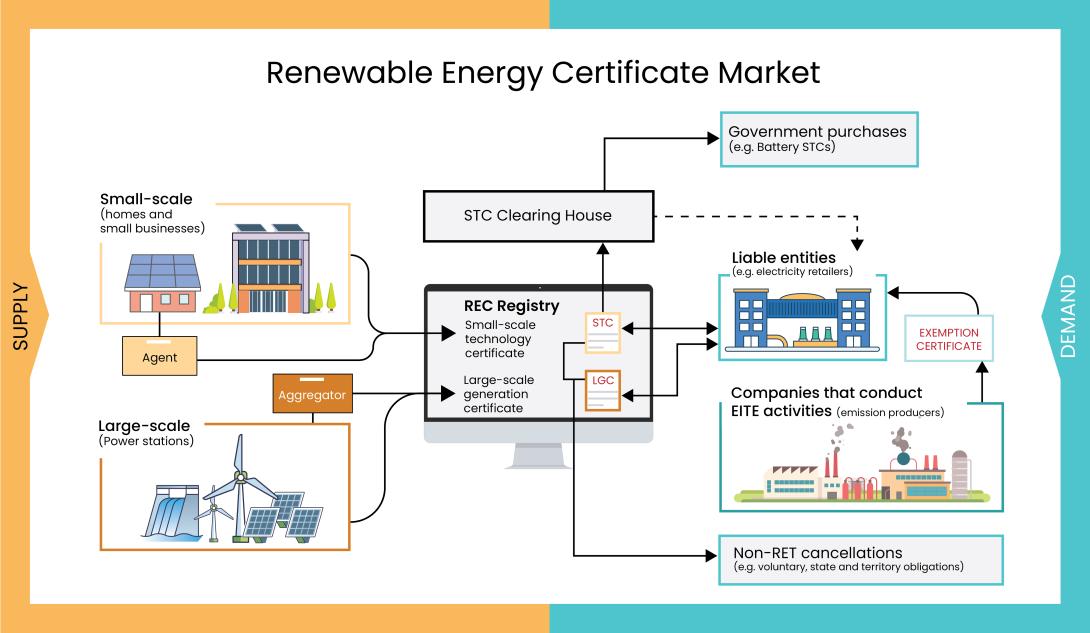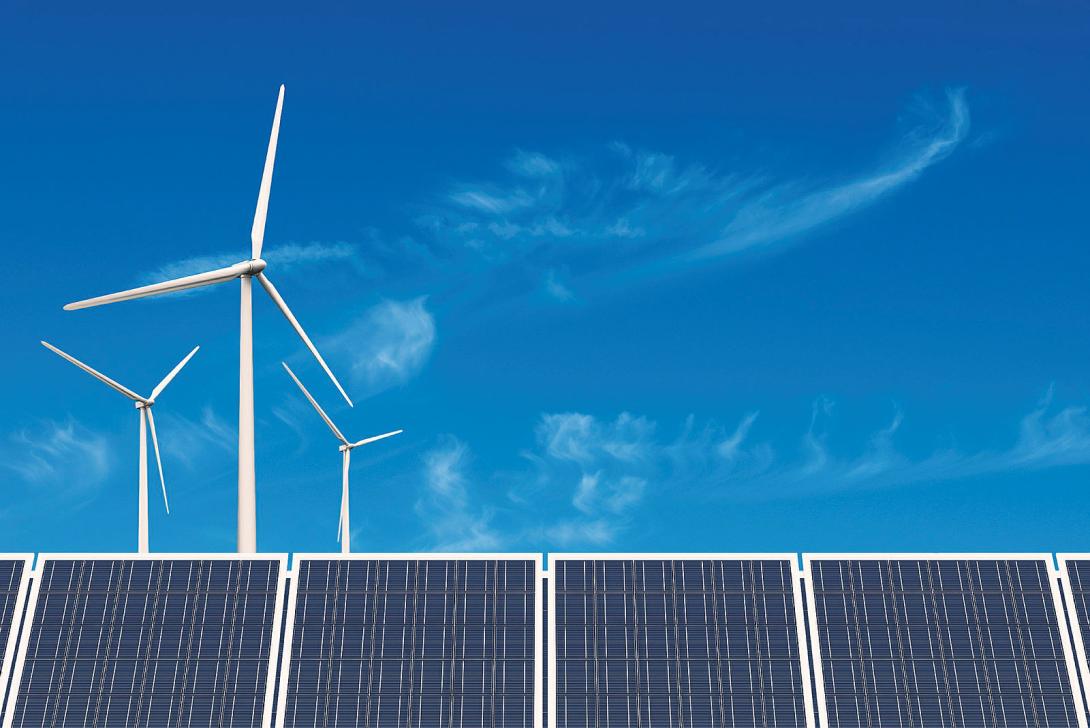What is the Renewable Energy Target?
The Renewable Energy Target (RET) is an Australian Government scheme that aims to reduce greenhouse gas emissions in the electricity sector and increase renewable electricity generation. The RET sets a target to deliver an extra 33,000 gigawatt-hours (GWh) of electricity from renewable sources every year from 2020 to 2030.
The RET creates a market to incentivise the generation and use of renewable energy. This supports the transition towards a more sustainable and less carbon-intensive energy system.
We administer the RET's 2 schemes.
Large-scale Renewable Energy Target
The Large-scale Renewable Energy Target (LRET) increases investment in large-scale renewable energy. It provides large-scale generation certificates to power stations, like wind farms and commercial solar plants.
Small-scale Renewable Energy Scheme
Under the Small-scale Renewable Energy Scheme (SRES), small-scale technology certificates are issued for the installation of eligible systems like rooftop solar panels and solar water heaters.
Latest data and reports
Find out the latest on investment in renewable energy and demand for large-scale generation certificates.

Popular topics
Renewable Energy Target participants and industry
Small-scale technology certificates
Renewable Energy Target liability and exemptions
Eligibility for the Renewable Energy Target
Large-scale generation certificates
How it works
The RET operates by creating tradable renewable energy certificates, which can be traded to offset the cost of installing an eligible renewable energy system. Each certificate represents one megawatt hour of electricity generated or displaced by a renewable energy system.
Liable entities are required to purchase and surrender renewable energy certificates. This increases the demand for renewable energy and stimulates investment in renewable energy technologies, reduces the cost of renewable energy over time and contributes to the reduction of greenhouse gas emissions.
There is also a secondary market where financial institutions, traders, agents and installers can buy, sell and voluntary surrender certificates.

Key features of the RET:
- Large-scale renewable energy power stations and the owners of small-scale renewable energy systems are eligible for certificates. This creates the supply side of the certificate market.
- Liable entities such as electricity retailers and other high-energy users, are legally required to buy certificates to meet their obligations under the RET. This creates the demand side of the certificate market.
Liable entities have to surrender certificates to us based on percentages set by regulations each year or pay a shortfall penalty.
Learn more about trading renewable energy certificates.
Who can participate
Householders and businesses who want to generate renewable energy and lower their consumption of grid electricity by installing small-scale renewable energy systems.
Large-power stations who want to expand or establish large-scale renewable power stations like solar or wind farms.
Electricity retailers and other high-energy users who are required by law to offset the generation of emissions-intensive energy and meet scheme compliance obligations. Certain industries and activities that are energy-intensive and trade-exposed (EITE) are given exemptions under the RET.
Find out more about RET participants and industry.
Renewable power and small-scale technology percentages
The renewable power percentage and small-scale technology percentage are targets set by the Australian Government each year. They are designed to ensure a proportion of Australia's electricity comes from renewable energy sources.
Under the RET, liable entities have to surrender certificates to meet the annual target of renewable electricity each year. The renewable power percentage and small-scale technology percentage helps calculate the amount of large-scale generation certificates and small-scale technology certificates that liable entities must surrender each year.
Find out more about the renewable power percentage and small-scale technology percentage.
The REC Registry
The REC Registry is a secure online system for transactions under the RET. It's where certificates are created, registered, traded and surrendered. There are also public registers with data about the RET.
We don't regulate certificate prices or oversee transfer or payment arrangements for certificates transferred through the REC Registry. The price of certificates is determined by supply and demand and negotiated between buyers and sellers.
Our role
We administer the RET by:
- administering the Large-scale Renewable Energy Target and Small-scale Renewable Energy Scheme
- ensuring compliance across our schemes
- providing the REC Registry as a platform for renewable energy certificate trading.
The Department of Climate Change, Energy, the Environment and Water oversees the policy of the RET. Read the policy intent on the department’s website.
Achieving the target
The target was met in January 2021 on a 12-month rolling basis. Over 33 million large-scale generation certificates need to be surrendered each year in addition to certificates that are voluntary surrendered.
The LRET encourages investment in large-scale renewable power stations to achieve 33,000 GWh of additional renewable electricity generation by 2020. The target stays the same from 2020 to 2030.
The expected and actual generation from power stations committed and accredited under the RET are important factors in the operation of the LRET and the large-scale generation certificate market’s ability to continue to meet the target.
History of the target
The LRET and SRES will operate until the end of 2030.
2001: The RET began as the Mandatory Renewable Energy Target. It aimed to source 2% of Australia’s electricity from renewable sources.
2009: The target was increased to the equivalent of 20% of Australia’s electricity (41,000 GWh).
2011: The RET was split into the LRET and the SRES.
2015: The LRET was reduced to 33,000 GWh in 2020 (with other targets adjusted accordingly).
2019: There was sufficient capacity to meet the 33,000 GWh target in September 2019.
2021: The RET of 33,000 gigawatt hours of additional renewable energy was met on a 12-month rolling basis.
2030: The last year for SRES installations and eligible renewable energy generation under the RET.
2031 onwards: The final liability reporting will be due and certificate creations will wind down. The Department of Climate Change, Energy, the Environment and Water is consulting on a proposed Renewable Electricity Guarantee of Origin (REGO) certificate mechanism. The REGO would provide certainty for renewable electricity investment and procurement, and support Australia’s energy transformation beyond 2030.
Under LRET new renewable energy power stations can still be accredited after 2020.
Until 2016, small-scale technology certificates were provided for small-scale solar systems under the SRES over a 15-year deeming period. From 2017, the deeming period was reduced to 14 years and will continue to reduce by one year, every year until the scheme ends in 2030. For eligible solar hot water and air source heat pumps, financial incentives are provided over a 10-year deeming period.
Cost recovery
The RET operates on a partial cost recovery basis. This means participants pay fees for specific activities under the scheme. Cost recovery ensures resourcing to administer the scheme effectively and efficiently.
In accordance with the Australian Government's Charging Framework, a Cost Recovery Implementation Statement has been developed. It was approved by the Minister for Climate Change and Energy on 14 December 2025.
Learn more about how this works in our RET Cost Recovery Implementation Statement.
Legislative framework
- Renewable Energy (Electricity) Act 2000
- Renewable Energy (Electricity) Amendment Act 2015
- Renewable Energy (Electricity) (Large-scale Generation Shortfall Charge) Act 2000
- Renewable Energy (Electricity) (Small-scale Technology Shortfall Charge) Act 2010
- Renewable Energy (Electricity) Regulations 2001
- Renewable Energy (Method for Solar Water Heaters) Determination 2016
- Renewable Energy (Electricity) Amendment (Transitional Provision) Regulations 2010
- Renewable Energy (Electricity) Amendment (Transitional Provisions) Regulations 2009
- Renewable Energy (Electricity) Amendment (Solar Zones and Other Measures) Regulations 2014
Latest RET news
View all newsarrow_right_altSafety the priority as solar battery installations surge
25 February 2026Changes to rebate for solar batteries from 1 May
17 February 2026Transparency is non-negotiable to protect integrity of clean energy schemes
04 February 2026Explore the Q4 2025 QCMR data workbook
21 January 2026
